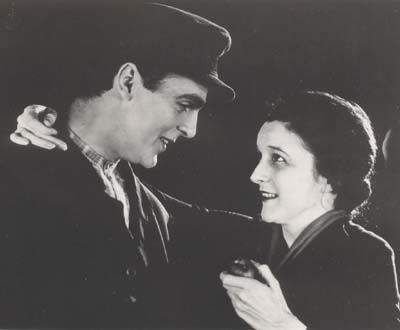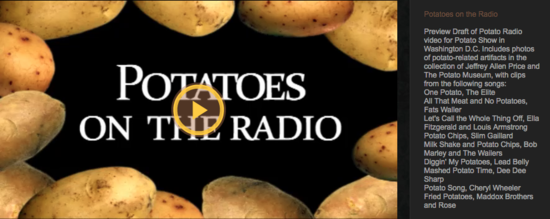- Home
- About
- Exhibits
- The Well-Traveled Potato
- Delicious
- Potatoes 101 and Fun Science and Art Projects for All Ages
- Potato Fun: Heads, Puns and Guns
- Cinematic and Musical Potatoes
- Surprising
- Praiseworthy
- Potato People
- Potato Places
- Book Shop
- Wide World of Potatoes: Links
- Contact Us
- Buy The Collection? Set Up TPM in Your Country/Community?
POTATO MOVIES AND MUSIC compiled by Jeffrey Allen Price
Starring Spuds: Cinematic Potatoes
And the Oscar for the Best Line About Potatoes in a film goes to:



The characters in Steven Spielberg's Empire of the Sun (1987) are lucky to get anything to eat, so they survive on a potato a day. They are prisoners of the Japanese during WW2. Based on J. G. Ballard's autobiographical novel, the movie tells the story of a boy named James Graham whose privileged life is upturned by the Japanese invasion of Shanghai, December 8, 1941. Separated from his parents, he is eventually captured and taken to Soo Chow confinement camp, next to a captured Chinese airfield. Amidst the sickness and food shortages in the camp, Jim attempts to reconstruct his former life, all the while bringing spirit and dignity to those around him.
Isn't Life Wonderful (1924) directed by D. W. Griffith

Tubers and Tinseltown share a long history together. It probably starts with a little known 1924 D.W.Griffith film called Isn't Life Wonderful? Spuds play a starring role here - publicity stills featured the leading lady and man smiling at each other over a tin basin of dirt-covered potatoes. The plot concerns an impoverished German family, driven from their homes, who live in two rooms in Berlin. They can only afford to eat a potato a day each.
One of the family's sons, Hans, falls in love with the orphaned Inga and is determined to make a life for himself. He secretly builds a small cottage for himself and his future bride. He also cultivates a small potato patch in a public garden. The harvested spuds are to ensure better times for the family, but, alas, as the young lovers are bringing home the potatoes from the field, their cart is set upon by robbers and all the taters stolen. Ruin! But wait... Inga turns to Hans and says, "I have you and you have me and, oh -- isn't life wonderful?" There's also something in the script about an ill grandmother, a hen who lays a timely egg and a pound of beef that costs 15 million paper marks, but that's not our focus, right?
The silent film about post-World War I Germans facing food shortages did not do well at the box office. Presumably Americans were too busy dancing the Charleston and playing the stock market to flock to a flick about their former enemies. Variety (Dec.3, 1924) doubted the picture would bring in the fans.
"The story is too realistic. It is a page torn from life. Those who rave about "the finer things in pictures" may not come to the box office in sufficient numbers to offset the out and out fans who will stay away. After all, the latter are the ones to be catered to. Fans like naught but the sweetened pap fed to them day after day on the screens of the country.
One point about this story should be pointed out immediately before some rabid anti-German jumps to the fore, proclaiming it another example of German propaganda. That is the fact that Major Jeffrey Maas, the author, is of the British army. In itself, that should be sufficient to still those who might shout "propaganda".
Photoplay (February 1925) wrote this of the film:
"No doubt, this is one of the finest pictures of the typical Griffith type. We are not quite sure that any other director would have made a flop of it, owing to the absence of a plot. Yet, one never loses interest for a moment; in fact, we seemed to share the hardships and sorrows of the half -starved Polish family and we rejoiced in their very happy moments."
No plot but packs of potatoes. That's our kind of flick. We think the two movie magazines got their countries mixed up, by the way. As best as we can decipher, Inga, the orphan, is a Polish refugee. The family, however, is German.
Spuds, starring comic Larry Semon, was released two years later in 1927. Evidently Semon was a rival to Chaplin in the early silent era but little of his work has survived today. He never made the transition to full-length films. In any event, Spuds was royally panned by Variety on May 4, 1927. The reviewer called it, "hokum all the way." But what an opening scene. Picture this. Hapless "Spuds" is a buck private first seen buried in an avalanche of potato peelings after a protracted period of kitchen police. The picture seems to fizzle from there. One reviewer concludes "Spuds has no human interest, and the gags, although well dovetailed at times, never mean much." But get this - much of the action of the flick is set in Mayonnaise, France. ( No way...)
Whoa! We almost forgot the first of the potato westerns, Pride of Palomar, a William Randolph Hearst picture made in 1922. Variety relates that the film exploits "the Californian's bogey man, the menace of the Japanese on the Pacific coast." It adds that Mr. Hearst's attitude towards Japanese land owners in California is well-known. It's the same as his attitude towards potatoes, we fear.
The villain of the piece is a Japanese Potato Baron and we capitalize that for you. Yes. Here's a sketch of the 8 reel plot taken from the American film Institute index. Seems that "Mike Farrell, the son of a Spanish don, (with a name like that we could have guessed,) comes home from his Army service to discover that his father is dead and his ranch, Palomar, is in the hands of John Parker. While Parker is maneuvering to turn Palomar over to Okada, a Japanese potato baron who desires the land for a colonization scheme, Mike falls in love with Kay Parker and by a clever ruse, and with a good horse, retains the ranch." A little something for everyone. Veterans, Japanese, potatoes, and a good horse.
Potato Western fans had to wait more than 50 years for their next film, this one called Potato Fritz. This 1976 German picture starring Hardy Kruger was shot in English for the US market. Kruger plays the title role of "Potato Fritz,"a fellow who settles in the middle of Indian territory "to plant potatoes and show the watching Indians his peacefulness by having his guns high up on a flagpole." Variety, May 26, 1976. There's more to the story than this, of course, surely. Try to catch it on the late show.
A similar-sounding plot turned up in an earlier French flick called, Les Patates. The Claude Autant-Lara picture shot in 1969 is set during the occupation. It's about "a man trying to grow a small stretch of potatoes in adversity." ( On acreage? In a garden?) Timeless tuber themes. Variety, December 10, 1969, goes on to say this:
"In a forbidden zone he tries to get potato seedlings by clandestinely crossing the border. He manages to do so and then his potato patch becomes an obsession. He keeps it going despite neighboring jealousy and blight but it leads to tragedy when his father is killed after some Germans want to dig it up."
We quote verbatim. The grammar is all Variety's.
Kissing cousin to the potato western is the potato kung-fu flick. There was one made in 1976 called Hot Potato, with a plot involving the feeding of the heroine to some pet tigers. Maybe the tigers thought she was a baked potato, we�re not certain.
Other flicks contained marvelous hidden potato scenes known to spud cinema fans. Like the violent potato stabbing scene in Who Slew Auntie Roo?, a remake of the Hansel and Gretel story starring Shelley Winters.
And the classic Marilyn Monroe and Tom Ewell potato chips and champagne moment in The Seven Year Itch. The Sunshine Boys has George Burns and Walter Matthau doing potato chip commercials. The King of Marvin Gardens, an early Jack Nicholson film, has Jack telling an endless story in which mashed potatoes figure in the violent death of an old man.
The finest mashie scene of all turns up in Close Encounters of the Third Kind. The hero sculpts the mound of mashies on his plate to resemble the mountain on which the extraterrestrials will land.
Wise Blood showed a street vendor selling mechanical potato peelers.
The Tin Drum begins and ends in a potato field.
A character in Woody Allen's Manhattan mentions that Louis Armstrong's recording of "Potato Head Blues" is one of the things that makes life worth living. The film about Wyoming homesteaders, Heartland, shows the pioneers planting potatoes the first spring. Settlers relied on spuds more than any other food to get them through the first harsh winter.
References are made to the Potato Bowl, a Southern California high school football game, in Twice in a Lifetime. Bette Midler in Down and Out in Beverly Hills tells Richard Dreyfuss that the best vodka is made from you guessed it. (We thank spud fanatic Steve Morse for some of these.)
Dernier Amour has a scene in which Ugo Tognazzi and Ornella Muti are peeling potatoes.
The Tree of Wooden Clogs, an Italian award winning film, featured a potato planting scene on promotion posters for the movie.
One Potato, Two Potato is a 1960's film starring Barbara Barry.
Yanks has several scenes featuring Fish 'n Chips.
The characters in Diners repeatedly eat French fries and gravy.
Spuds cinema fans, we don't want to exhaust you. We have more references, yes indeed. We will leave you with this final mention. It's a film for gay potatoes called La Patata Bollente, an Italian offering done in 1980. We can't seem to make much of the plot which concerns factory life and Communist politics and intolerance to gays. Who knows? It's called Hot Potato in English. The music, catch this, was by Tato Savio. We kid you not.



